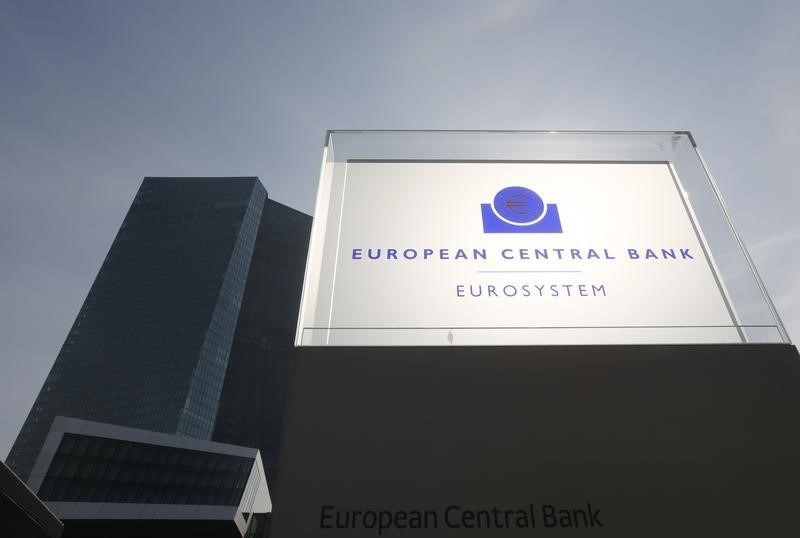By John Geddie and Nigel Stephenson
LONDON (Reuters) - Just three weeks into the European Central Bank's 19-month bond-buying programme, analysts are already speculating that it may throttle back the pace of purchases early, possibly even this year.
An upturn in growth or inflation, a dramatic rise in asset prices and a scarcity of bonds have all been cited as factors that could prompt the ECB to "taper" its purchases.
"We expect the ECB will decide to cut back its bond purchases as early as the second half of this year," said DZ Bank analyst Hendrik Lodde, adding the economy could improve towards year-end.
When ECB President Mario Draghi unveiled the 1 trillion quantitative easing programme on March 5, he said the bank would buy 60 billion euros (44 billion pounds) of bonds a month until September 2016 or until inflation is back on a path towards the bank's target of close to but below 2 percent. Markets were fuelled by the belief that this meant the programme could go on for longer than the stated duration.
ECB insiders say that so far there has been no discussion among policymakers of tapering QE and Draghi told the European Parliament last week he believed a recovery in inflation depended on full implementation of the programme.
Some analysts say evidence of the tapering debate may at some point emerge in the minutes, or accounts as the ECB calls them, of its policy meetings, the latest of which are published on Thursday.
Minutes of the Jan. 22 meeting, at which QE was launched, already showed division over QE. Most policymakers voted for immediate action, though some said such a step should only be taken in "contingency" situations.
Unlike the QE programmes initiated by the U.S. Federal Reserve in 2008 and the Bank of Japan in 2013, the ECB's has been launched with a "tailwind" of improving economic data.
On launch day, the ECB lifted its growth forecast to 1.5 percent for 2015, from a previous 1 percent and said inflation would rise from zero this year to 1.8 percent in 2018.
Since then, euro zone data has generally beaten forecasts. Business activity this month was its highest since May 2011, and inflation is expected to nudge back into positive territory after months of declines.
"I think that the ECB could consider tapering before September 2016 if it was really convinced that it no longer needs QE to achieve a return to price stability (lower but close to 2 percent) on a sustained basis," said Francesco Papadia, a former ECB director general for market operations.
"However the hurdle to take such a decision will be at least as high as the hurdle to decide on QE," he added, as tapering before the due end date would be an effective tightening of policy compared with market expectations.
EXCESSIVE DISTORTION
So far, QE has helped drive down bond yields, even though many had already been at record lows before its launch. This has raised concerns that money-printing could lead to a bubble in the market.
Before QE began, many analysts said the ECB could struggle to buy enough bonds as investors held on to them, either for regulatory reasons or in hope of securing a better price.
Vincent Chaigneau, head of rates and FX strategy at Societe Generale (PARIS:SOGN), has an overweight position in core and peripheral euro zone bonds, favouring long-dated paper, but sees a risk.
"The major risk to that view is that the ECB, at some point, could scale down the programme on evidence that it is causing excessive distortion in the euro bond markets."
Others say tapering remains very unlikely, given it is a relatively short scheme.
The BOJ is committed to two years, but is under pressure to extend, while the Fed bought Treasuries for the best part of 3-1/2 years after an initial economic rebound proved short-lived.

Berenberg Bank economist Christian Schulz, who used to work at the ECB, said: "It's been such a painful process to get to QE, to buying sovereign bonds ... Unless there is a strong reason to do it, I don't think they would undermine their own credibility by scaling it back before it even ends because it's not a very long programme."